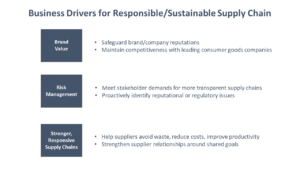Responsible Sourcing
Responsible sourcing (also referred to as sustainable or ethical sourcing, sustainable procurement, or supply chain sustainability) aims to ensure business practices related to ingredient sourcing do not negatively impact people or the environment.
For PCPC member companies, responsible sourcing is an integral part of procurement and supply chain management approaches, with processes to better understand and manage risks such as supply disruption, cost volatility or compliance with local laws and regulations, and risks to brand or enterprise reputation. Many PCPC members have a code of conduct for suppliers, which outlines expectations for behavior and practices related to child or forced labor, freedom of association and collective bargaining, nondiscrimination/non-harassment, health and safety, working hours, wages, treatment of workers, and protection of the environment.
By improving supplier practices, companies can drive sustainability efforts through their value chains, from providing for the needs and assuring the rights of all workers to optimizing resource use and preventing environmental damage. Advancing supply chain sustainability benefits people and the planet. By better managing sourcing risks and engaging with suppliers to optimize their social and environmental performance, companies can unlock business value, and build competitive advantage against a backdrop of increasing consumer, regulatory and investor expectations.

Resources:
http://www.responsiblebusiness.org/media/docs/RBAPracticalGuideResponsibleSourcing.pdf
https://iccwbo.org/content/uploads/sites/3/2008/10/ICC-guide-to-responsible-sourcing.pdf
https://www.ohchr.org/documents/publications/hr.pub.12.2_en.pdf
https://www.bsr.org/reports/BSR_Report_Supply_Chain_Leadership_Ladder_2.0.pdf

